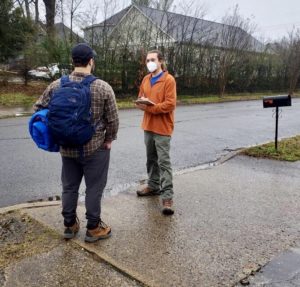CHATTANOOGA – The annual count of the region’s homeless population takes place every year on the last Thursday in January.
Officials at the Chattanooga Regional Homeless Coalition say the count spanning Hamilton County and 10 surrounding counties is expected to be higher than average due to consequences of the COVID-19 pandemic. Recent years have brought in record numbers of volunteers to conduct the count, but this year only outreach workers and other specified employees will be counting.
The federally mandated Point-In-Time Count takes place simultaneously across the country once a year to provide lawmakers with a detailed understanding of the status of homelessness. The data from the count shows the government and agencies where improvements need to be made and helps the U.S. Department of Housing and Urban Development know where to allocate funds.
In 2020, the economic effects of the pandemic compelled lawmakers to pass temporary legislation that protects those at risk of being homeless from being evicted and gives landlords incentives and subsidies to help those in crisis. But those laws are tenuous and uncertain.
Higher unemployment and economic uncertainty have led to an unprecedented crisis for those seeking stable and affordable housing. Calls made into the Chattanooga Regional Homeless Coalition’s helpline are up 150% from last year. The helpline answered by staff trained in crisis and trauma response provides resource information to those in or close to a homelessness situation.
“When someone calls in, they’ll find an empathetic listener utilizing motivational interviewing skills to listen carefully to their story for the strengths and barriers regarding the crisis they are going through,” Coordinated Entry Manager Jamie Ascarate said of the helpline. “We work with the caller to come up with a plan to hopefully keep them from hitting the homelessness system or to review housing options for those already experiencing homelessness.”
Executive Director Wendy Winters said COVID-19 is to blame for the increase in calls to the helpline.
“People that hit homelessness now will have a harder time finding homes because there is such little housing available,” Winters said. “It will be really interesting to see what the homeless numbers are to give us an idea of the impact of COVID. We’ve never had a situation like this before. I suspect the data will be eye-opening.”
The data from the count will take about one month to be compiled before being released to the public.
The Chattanooga Regional Homeless Coalition serves as the coordinating agency of Southeast Tennessee’s homeless response system. To learn more about how to support these efforts, please visit homelesscoalition.org.

